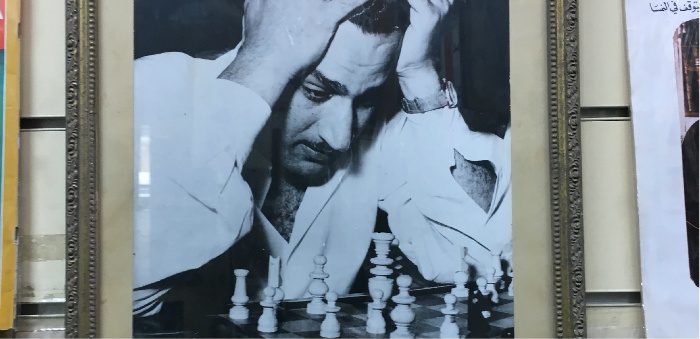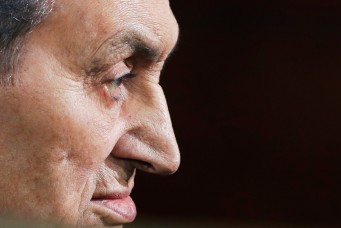1967 War’s Real Legacy in Egypt
The defeat in the 1967 war with Israel deeply altered Egypt’s position in the Arab World.

A photograph of Gamal Abdel Nasser found in a Khan Al-Khalili antique shop, Cairo. Dec 17, 2016. Jonathan Guyer for the Cairo Review
From the nineteenth to mid-twentieth century, Egypt pioneered the experiment of building a modern, secular, Western-oriented Arab-majority state, out of four-centuries-old Ottoman rule. President Gamal Abdel Nasser, who in the early 1950s overthrew Egypt’s monarchy and dismantled its liberal political structure, turned the Egyptian state into a force fighting colonialism across the region, and sought to create out of disparate Arab countries a semi-unified “nation” that, he envisaged, would emerge, in one or two generations, as a global power.
Until the 1967 defeat, Nasser’s project resonated with the aspirations of tens of millions of Arabs. It was a moment of global transformation—the end of the Second World War and the fall of Europe’s empires. Large groups of Arabs, especially the first generations ever to be educated in the West, felt the “nation” was on the verge of discarding centuries of regress and subordination; that the “people” would now reap the fruits of the past century’s modernization; and that a new dawn after centuries of darkness awaited the Arab nation.
Nasser’s project became a dream, and the man its hero. For Egypt, however, the real value was in evolving its place in the collective Arab psyche from being the country where many Arabs came to learn, work, and holiday, into the custodian of the ideals of modern Arab nationalism. This custodianship gave legitimacy to Egypt’s political leadership in the Arab World.
June 1967, when Israel obliterated Egypt’s air force and occupied the whole of Sinai, crushed that dream. The blow was not in the military defeat. Six years later, in the October 1973 war, Egypt’s success at launching a strategic military surprise and a crossing of its forces into Sinai, secured for it serious negotiations with Israel, sponsored by the United States. Ultimately, Egypt managed to regain all the lands it had lost in 1967. The blow, however, was in the humiliation, and the crumbling of the pride and the image of the hero, Nasser, which June 1967 inflicted.
Most Arabs felt humbled. Arab art, especially poetry, spent two decades dissecting the pain. For some, like the Syrian poet Nizar Kabbani, Nasser became the Arab’s “Christ” who was to deliver the “nation” its historical salvation. For others, his project smacked of vacant rhetoric. Half a century later, Arab political discourse continues to oscillate between revering and loathing the man, and more importantly between self-victimization and self-flagellation.
The blow to Nasserist Arab nationalism took from Egypt a lot of its claim to leadership. No one understood this better than Nasser himself. His rhetoric, style of governing, even his posture and walk changed. Christ became mortal. Indeed, less than three years later, he died at the age of 52. His successor, Anwar Sadat, believed that his leading the country into the October 1973 war gave him a new mandate—not only to rule Egypt, but to chart for the country a new strategic direction. President Sadat harbored the ambition that Egypt would move beyond its connections with the Arab World and “join the developed world, the West”—the same vision, or delusion, that a century earlier, had inspired the most ambitious ruler of Egypt’s liberal age, Khedive Ismail. Ismail paid the price of his ambition, an exile in Naples and Vienna. Sadat paid with his life. In October 1981, Egyptians watched a group of militant Islamists assassinate the modern-day pharaoh live on television.
President Hosni Mubarak, who took over after the assassination, lacked Sadat’s ambition and Nasser’s charisma. In his first term in power (effectively throughout the 1980s) he eschewed real politics altogether. He focused on the country’s teetering economy, particularly on upgrading the infrastructure. For him, foreign policy’s primary objectives were avoiding problems and serving the economy. That sat well with millions of Egyptians who, after decades of political and military adventurism and fighting, aspired to better living. Like most people, they prioritized daily life over intangible notions of identity, the country’s role in the region, or place in the world.
But three decades of a foreign policy of “muddling through” became political surrealism—open to any interpretation, or charges of meaninglessness. Egypt’s 2011 uprising was not about foreign policy; but lurking behind the colossal anger that contributed to the eruption of the January 2011 revolt were the frustrations of a young generation of Egyptians about the yawning gap between the nation’s historic image as a powerful leader in the region, and the reality of a country consumed by its colossal social and economic problems.
Fifty years after June 1967, Egypt is no closer to bridging that gap. The dichotomy between the country’s nostalgia for that historic role and its current absorption with its challenges continues to torment the society. In 1930, Gramsci observed that “morbid moods arise from the unwillingness of the old to die and the inability of the new to be born.” Egypt’s old view of itself as the leader of the Arabs refuses to go into the shadows of historical memory. And no fresh self-image, and definition of what it means to be Egypt in the Arab World, has emerged either. Perhaps young Egyptian thinkers can dispel the morbidness.
Tarek Osman, a political economist and broadcaster focused on the Arab and Islamic worlds, is the author of Islamism and Egypt on the Brink. On Twitter: @TarekmOsman.
Subscribe to Our Newsletter




